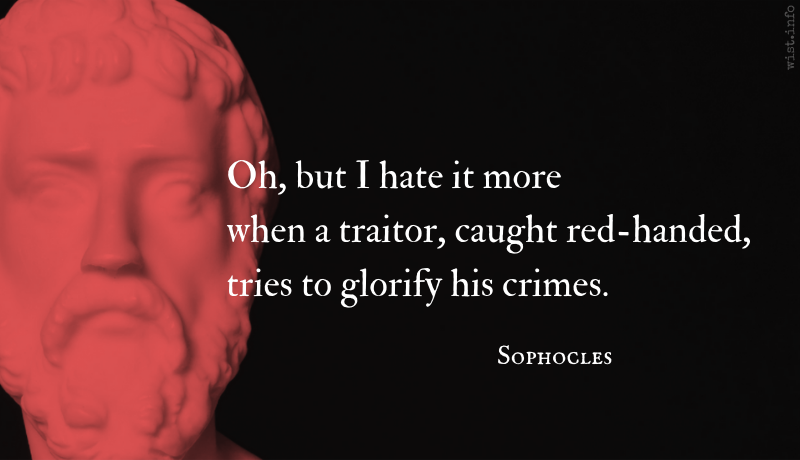At long last, citizens, Lucius Catilina, blazing with insolence, breathing forth blasts of every audacious rascality, outrageously plotting to overthrow his country, menacing yourselves and our city with fire and sword, has been expelled from Rome by our action, or allowed to leave, or bidden farewell as he took his departure. Gone, retired, run away, broken out, express it how you will.
[Tandem aliquando, Quirites, L. Catilinam, furentem audacia, scelus anhelantem, pestem patriae nefarie molientem, vobis atque huic urbi ferro flammaque minitantem ex urbe vel eiecimus vel emisimus vel ipsum egredientem verbis prosecuti sumus. Abiit, excessit, evasit, erupit.]
Marcus Tullius Cicero (106-43 BC) Roman orator, statesman, philosopher
Orationes in Catilinam [Catilinarian Orations], No. 2, § 1, cl. 1 (2.1.1) (63-11-09 BC) [tr. Grant (1960)]
(Source)
Informing the Senate that Catiline and many of his co-conspirators had fled Rome the day before.
(Source (Latin)). Alternate translations:
At last with much ado, have we either expelled, or let out, or else waited upon L. Catiline of himself, going out of Town, foaming with rage, breathing Treason, unnaturally plotting the destruction of his Countrey, and menacing you and this City with Fire and Sword. He is gone, he is got his way, he is escaped, he is broke loose.
[tr. Wase (1671)]
At length, my fellow-citizens, Lucius Catiline, that nefarious traitor, burning with frantic fury, breathing vengeance and destruction; that public enemy, who meditated the ruin of his country, and threatened this city with sword and fire; that monster of iniquity has sounded his retreat. He is gone; he is fled; he has escaped; he has disappeared.
[tr. Sydney (1795)]
At length, O Romans, we have dismissed from the city, or driven out, or, when he was departing of his own accord, we have pursued with words, Lucius Catiline, mad with audacity, breathing wickedness, impiously planning mischief to his country, threatening fire and sword to you and to this city. He is gone, he has departed, he has disappeared, he has rushed out.
[tr. Yonge (1856)]
At length, at last, oh Romans! we have either cast out of the city Lucius Catiline, raging with audacity, panting after crime, impiously attempting the destruction of our native land, threatening you and this city with sword and with flame, or we have sent him forth, or we have followed with words him when going out. He has gone away, he has departed, he has escaped, he has burst forth.
[tr. Mongan (1879)]
At length, Romans, either we have cast out of the city, L. Catiline, raging with audacity, panting after crime, attempting nefariously the pest (destruction) of the country, threatening sword and flame to you and to this city, or we have sent (him) out, or we have followed with words himself going out. He has departed, he has gone out, he has escaped, he has burst out.
[tr. Underwood (1885)]
At length, finally, Romans, L. Catiline, raging with insolence, breathing out crime, attempting impiously the ruin of the country, threatening sword and flame to you and to this city, either we have cast out of the city, or we have sent (him) out, or with words we have followed him going himself. He has departed, he has gone forth, he has escaped, he has burst out.
[tr. Dewey (1916)]
He is gone, he has fled, he has eluded our vigilance, he has broken through our guards.
[Source]
Quotations about:
traitor
Note not all quotations have been tagged, so Search may find additional quotes on this topic.
Oh, but I hate it more
when a traitor, caught red-handed,
tries to glorify his crimes.[μισῶ γε μέντοι χὤταν ἐν κακοῖσί τις
ἁλοὺς ἔπειτα τοῦτο καλλύνειν θέλῃ.]Sophocles (496-406 BC) Greek tragic playwright
Antigone, l. 495ff [Creon] (441 BC) [tr. Fagles (1982), l. 552ff]
(Source)
Original Greek. Alternate translations:
Howbeit, to me it is no less abhorrent,
When, caught in criminality, the culprit
Seeks with fine words to beautify his deed.
[tr. Donaldson (1848)]
More hateful still the miscreant who seeks
When caught, to make a virtue of a crime.
[tr. Storr (1859)]
But not less hateful
Seems it to me, when one that hath been caught
In wickedness would give it a brave show.
[tr. Campbell (1873)]
But, truly, I detest it, too, when one who has been caught in treachery then seeks to make the crime a glory.
[tr. Jebb (1891)]
I cannot bear to see the guilty stand
Convicted of their crimes, and yet pretend
To gloss them o'er with specious names of virtue.
[tr. Werner (1892)]
But verily this, too, is hateful, -- when one who hath been caught in wickedness then seeks to make the crime a glory.
[tr. Jebb (1917)]
But now much worse than this
Is brazen boasting of barefaced anarchy.
[tr. Fitts/Fitzgerald (1939), l. 390ff]
The criminal who being caught still tries.
To make a fair excuse , is damned indeed.
[tr. Watling (1947), l. 414ff]
I hate it too when someone caught in crime
then wants to make it seem a lovely thing.
[tr. Wyckoff (1954)]
But this is worst of all: to be convicted
And then to glorify the name as virtue.
[tr. Kitto (1962)]
But how I hate it when she's caught in the act, And the criminal still glories in her crime. [tr. Woodruff (2001)]
I hate it when someone, caught in ugliness, afterwards wants to make it look pretty. [tr. Tyrell/Bennett (2002)]
And there’s nothing I hate more than when someone is caught committing a crime and tries to hide it by embellishing it with sweet words.
[tr. Theodoridis (2004)]
How I despise
a person caught committing evil acts
who then desires to glorify the crime.
[tr. Johnston (2005), l. 562ff]
I, for my part, hate anyone caught in the act who tries to beautify his crimes thereupon.
[tr. Thomas (2005)]
I hate it when someone is caught in the midst of their evil deeds and tries to gloss over them.
[tr. @sentantiq (2020)]
A nation can survive its fools, and even the ambitious. But it cannot survive treason from within. For the traitor appears not a traitor — he speaks in the accents familiar to his victims, and he appeals to the baseness that lies deep in the hearts of all men. He rots the soul of a nation — he works secretly and unknown in the night to undermine the pillars of the city — he infects the body politic so that it can no longer resist. A murderer is less to be feared. The traitor is the carrier of the plague. You have unbarred the gates of Rome to him.
MAL: How come you didn’t turn on me, Jayne?
JAYNE: Money wasn’t good enough.
MAL: What happens when it is?
JAYNE: Well, that’ll be an interesting day.
MAL: I imagine it will.
Risk for risk, for myself I had rather take my chance that some traitors will escape detection than spread abroad a spirit of general suspicion and distrust, which accepts rumor and gossip in place of undismayed and unintimidated inquiry.
Learned Hand (1872-1961) American jurist
“A Plea for the Open Mind and Free Discussion,” speech, University of the State of New York, Albany (1952-10-24)
(Source)






